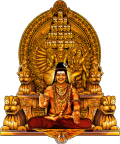The word ‘Pada’ means ‘Sacred feet’ in Sanskrit; pāda puja means to honor the avatar in loving devotion and gratitude at his lotus feet.
The Vedas are the most immense and complete system of knowledge known to man. Vedas are the knowledge of the truth, absolute truth, the self’s truth, and the underlying mysteries of existence. The Vedāgmas provide various time-tested, age-old authentic solutions for all humanity’s problems. My administration and Kailasa recognise the need to establish core activities of Sanatana Hindu Dharma by highlighting the ritualistic practices of Hinduism such as but not limited to Pratyaksha Pada Puja. Pada Puja is a unique celebration of expressing overflowing deep gratitude to the Guru, the representative of Paramaśiva in physical form. The word ‘pada’ means ‘sacred feet’ in Sanskrit; Pāda Puja means to honor the Guru, the representative of Paramaśiva in loving devotion and gratitude at His lotus feet. The scriptural reference: In the sacred scripture of Sri Guru Gita, Paramaśiva reveals to Devi,
dhyānamūlaṁ guromūrtiḥ pujāmūlaṁ guroḥ padaṃ mantramūlaṁ gurorvākyaṁ muktimūlaṁ guroḥ kṛpā ॥ 86 ॥
The original root and essence of Dhyana (meditation) is Guru murti, the Guru’s embodied form; the original root of worship is Gurupadam, the Guru’s Feet; the original root of mantra is Guru vakyam, the Guru’s Word. The original cause of liberation is Gurukripa, the Guru’s grace, and compassion.
Vedic commentaries include the ancient scripture Kularnava Tantra, which says: “The glory of surrendering at Guru’s feet is great. Remember the Guru’s sandals, they provide protection against great diseases, great disturbances, great evils, great fears, great calamities, and great sins.”
KDRW is working towards assisting all the Hindus to experience oneness with the divine through Pratyaksha Pada Puja. Pratyaksha Pada Puja is a mark of gratitude for the health, wealth, energy, and transformation experienced in one’s life through the blessings and presence of The SPH Nithyananda Paramashivam, the 1008th incarnation of Paramaśiva.
